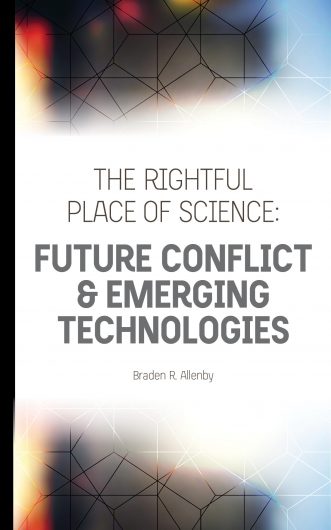CSPO News
The Future of Conflict
Our newest publication explores the emerging technologies that are destabilizing modern conflict.
The fact that technologies are advancing at a dizzying rate is so obvious as to be unremarkable. Of course our phones can stream foreign movies while we’re riding the subway. Of course deep learning artificial intelligence is conquering tasks once viewed as impossible for computers. Of course our cars will soon drive themselves, reshaping our infrastructure and communities in unimaginable ways. Of course we’re now able to precisely edit genes, with ramifications ranging from curing diseases to altering human evolution.
But the newest technological advances are also having an underappreciated impact on one of humanity’s oldest practices: conflict. Emerging technologies are making the world more complex, interconnected, and dangerous—while undermining the tools, institutions, and assumptions that have buttressed thousands of years of strategic thinking about human conflict.
The very scope and definition of conflict is being destabilized as adversaries take advantage of emerging technologies. Rather than engaging only military and security domains, the arenas for conflict now encompass cultural, economic, technological, and political dimensions. The participants have changed too: where nations were once the dominant players on the world stage, non-state actors, including terrorist groups and corporations, compete for global power with tools that in the past were available only to national governments.
Predicting how this radically new geopolitical environment might play out requires understanding the shifting dynamics of modern conflict. Arizona State University professor Braden R. Allenby’s newest book, The Rightful Place of Science: Future Conflict & Emerging Technologies, provides the necessary guide through this complex landscape.
A leading analyst of emerging technologies in terms of both their military application and their ethical implications, Allenby explores how these new technologies are transforming military and security strategy, making familiar institutions and traditional approaches obsolete. From Russia’s recent invasion of Ukraine to the “durable disorder” of the new Middle East, from the digital frontier of cyber conflict to the use of autonomous lethal military robots, Future Conflict & Emerging Technologies offers a concise and readable introduction to the trends shaping our geopolitical present and future.
James Hennessy, former President and CEO of ING Mutual Funds, called Future Conflict & Emerging Technologies “required reading for anyone trying to implement strategy—financial, military, or otherwise—in our complex and rapidly changing world.” Buy your copy of this essential book from Amazon.com today.
